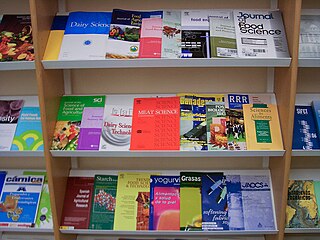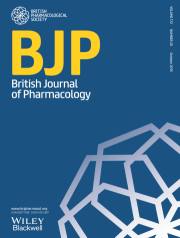
An academic journal or scholarly journal is a periodical publication in which scholarship relating to a particular academic discipline is published. Academic journals serve as permanent and transparent forums for the presentation, scrutiny, and discussion of research. They nearly universally require peer review or other scrutiny from contemporaries competent and established in their respective fields. Content typically takes the form of articles presenting original research, review articles, or book reviews. The purpose of an academic journal, according to Henry Oldenburg, is to give researchers a venue to "impart their knowledge to one another, and contribute what they can to the Grand design of improving natural knowledge, and perfecting all Philosophical Arts, and Sciences."
PLOS Biology is a monthly peer-reviewed scientific journal covering all aspects of biology. Publication began on October 13, 2003. It is the first journal published by the Public Library of Science. The editor-in-chief is Nonia Pariente.
Proceedings of the Royal Society is the main research journal of the Royal Society. The journal began in 1831 and was split into two series in 1905:
The impact factor (IF) or journal impact factor (JIF) of an academic journal is a scientometric index calculated by Clarivate that reflects the yearly mean number of citations of articles published in the last two years in a given journal, as indexed by Clarivate's Web of Science.

Cell is a peer-reviewed scientific journal publishing research papers across a broad range of disciplines within the life sciences. Areas covered include molecular biology, cell biology, systems biology, stem cells, developmental biology, genetics and genomics, proteomics, cancer research, immunology, neuroscience, structural biology, microbiology, virology, physiology, biophysics, and computational biology. The journal was established in 1974 by Benjamin Lewin and is published twice monthly by Cell Press, an imprint of Elsevier.

Biology Letters is a peer-reviewed, biological, scientific journal published by the Royal Society. It focuses on the rapid publication of short high quality research articles, reviews and opinion pieces across the biological sciences. Biology Letters has an average turnaround time of twenty four days from submission to a first decision.

The American Journal of Public Health is a monthly peer-reviewed public health journal published by the American Public Health Association that covers health policy and public health. The journal was established in 1911 and its stated mission is "to advance public health research, policy, practice, and education." The journal occasionally publishes themed supplements. The editor-in-chief is Alfredo Morabia.

Conservation Biology is a bimonthly peer-reviewed scientific journal of the Society for Conservation Biology, published by Wiley-Blackwell and established in May 1987. It covers the science and practice of conserving Earth's biological diversity, including issues concerning any of the Earth's ecosystems or regions. The editor-in-chief is Mark Burgman.

The British Journal of Pharmacology is a biweekly peer-reviewed medical journal covering all aspects of experimental pharmacology. It is published for the British Pharmacological Society by Wiley-Blackwell. It was established in 1946 as the British Journal of Pharmacology and Chemotherapy. The journal obtained its current title in 1968.

ACS Chemical Biology is a monthly peer-reviewed scientific journal published since 2006 by the American Chemical Society. It covers research at the interface between chemistry and biology spanning all aspects of chemical biology. The founding editor-in-chief was Laura L. Kiessling. Chuan He began the role of editor-in-chief in January 2022. According to the Journal Citation Reports, the journal has a 2022 impact factor of 4.0.

The Canadian Journal of Forest Research is a peer-reviewed scientific journal published by NRC Research Press. It covers research related to forest resource management, including forest biology, biometry, conservation, economics, genetics, human dimensions, management, operations, protection, policy, remote sensing, soils, silviculture, wildlife and wood science. The journal publishes articles, reviews, notes, and commentaries. The journal was established in 1971 and published quarterly till 1982. From 1983 till 1986 it was published bimonthly and since 1987 it is published monthly.
Peter Shaw Ashton is a British botanist. He is Charles Bullard Professor of Forestry at Harvard University, and director of the Arnold Arboretum there from 1978 to 1987.

The American Journal of Primatology is a monthly peer-reviewed scientific journal and the official journal of the American Society of Primatologists. It was established in 1981 and covers all areas of primatology, including the behavioral ecology, conservation biology, evolutionary biology, life history, demography, paleontology, physiology, endocrinology, genetics, molecular genetics, and psychobiology of non-human primates. Besides its regular issues, the journal publishes a yearly supplementary issue detailing the program of the society's annual meetings. The editor-in-chief is Karen Bales. The types of papers published are: original research papers, review articles, book reviews, commentaries, and plenary addresses.

Functional Ecology is a monthly peer-reviewed scientific journal covering physiological, behavioural, and evolutionary ecology, as well as ecosystems and community ecology, emphasizing an integrative approach.
The American Journal of Biological Anthropology is a peer-reviewed scientific journal and the official journal of the American Association of Biological Anthropologists. It was established in 1918 by Aleš Hrdlička.

Journal of Zoological Systematics and Evolutionary Research is a quarterly, peer-reviewed, scientific journal, published by Wiley-Blackwell. It was originally established in 1963, then reestablished in 1994 by John Wiley & Sons. The editor in chief is Dr. Wilfried Westheide. According to Journal Citation Reports, the 2016 impact factor for this journal is 2.444.
Frontiers Media SA is a publisher of peer-reviewed, open access, scientific journals currently active in science, technology, and medicine. It was founded in 2007 by Kamila and Henry Markram. Frontiers is based in Lausanne, Switzerland, with other offices in London, Madrid, Seattle and Brussels. In 2022, Frontiers employed more than 1,400 people, across 14 countries. All Frontiers journals are published under a Creative Commons Attribution License.
Julie Sloan Denslow is an American botanist, ecologist and biologist. She grew up in South Florida, and always loved nature. She graduated from Coral Gables Senior High School in 1960. She has contributed to the field of ecology through her work with and research of tropical ecosystems. Earlier in her career, she spent significant time in the field in tropical locations such as Costa Rica and Panama, as well as in temperate locations in Louisiana. and later on in her career she worked more in the office and classroom, but still spent the occasional day in the field. She has focused on research involving the ecology of exotic invasive plant species, and on ecosystem reactions and recovery following disturbances. Denslow is also a strong supporter of gender equality in the natural sciences, pushing for equal representation of women involved in tropical research and leadership during a 2007 Gender Committee Meeting within the Association for Tropical Biology and Conservation (ATBC). Her most notable contribution to tropical research is her paper "Gap Partitioning among Tropical Rainforest Trees", published in 1980.
Jennifer S. Powers is an American ecologist and full professor in the departments of ecology, evolution and behavior, and plant and microbial biology at the University of Minnesota. Powers' research has advanced the understanding of global change consequences, ecosystem ecology, restoration and conservation of tropical dry forests. She also has been very active on several editorial boards, and in 2019 became the editor-in-chief of Biotropica, a scientific journal from the Association of Tropical Biology and Conservation (ATBC).
Robin Lee Chazdon is an American tropical ecologist. She is a professor emeritus of ecology and evolutionary biology in the College of Liberal Arts and Sciences at the University of Connecticut.










